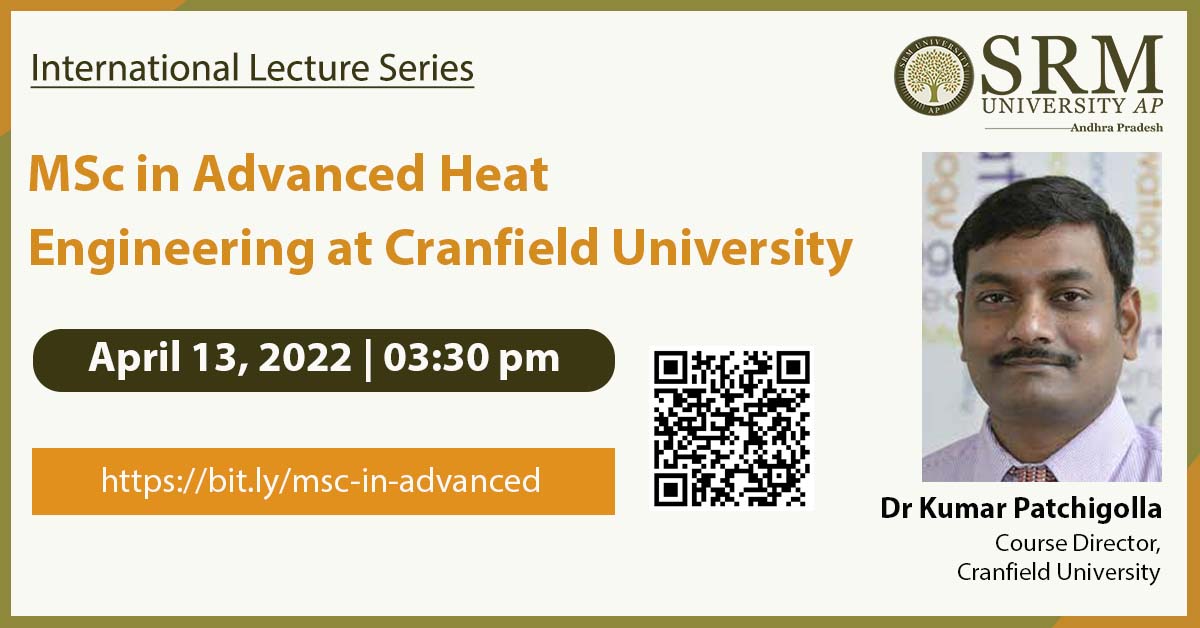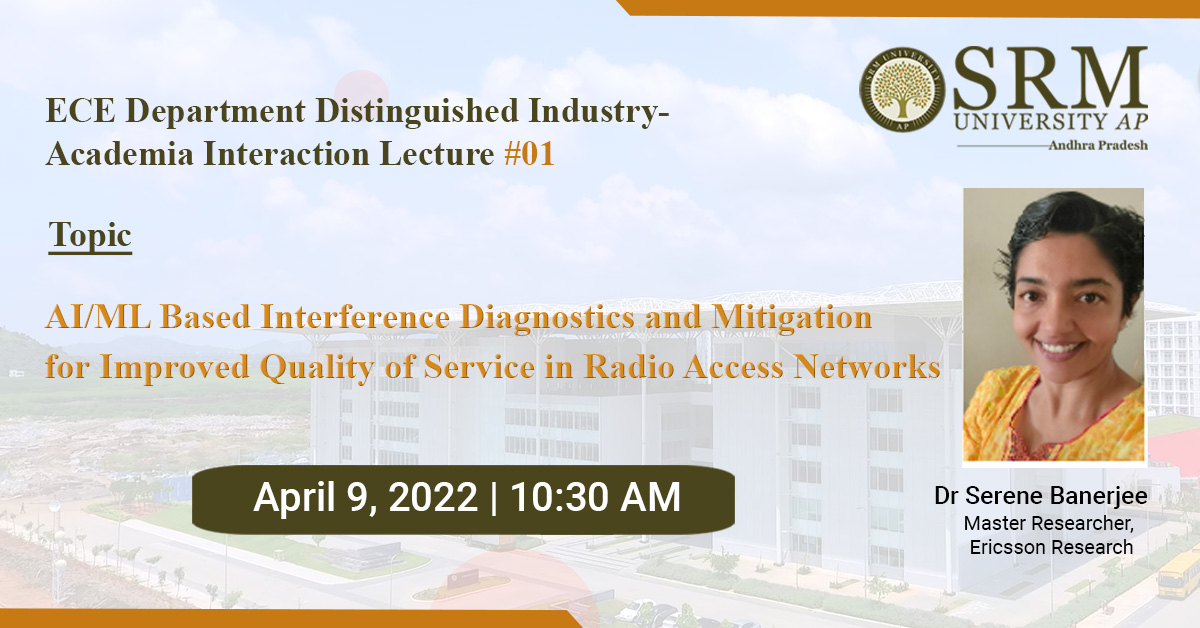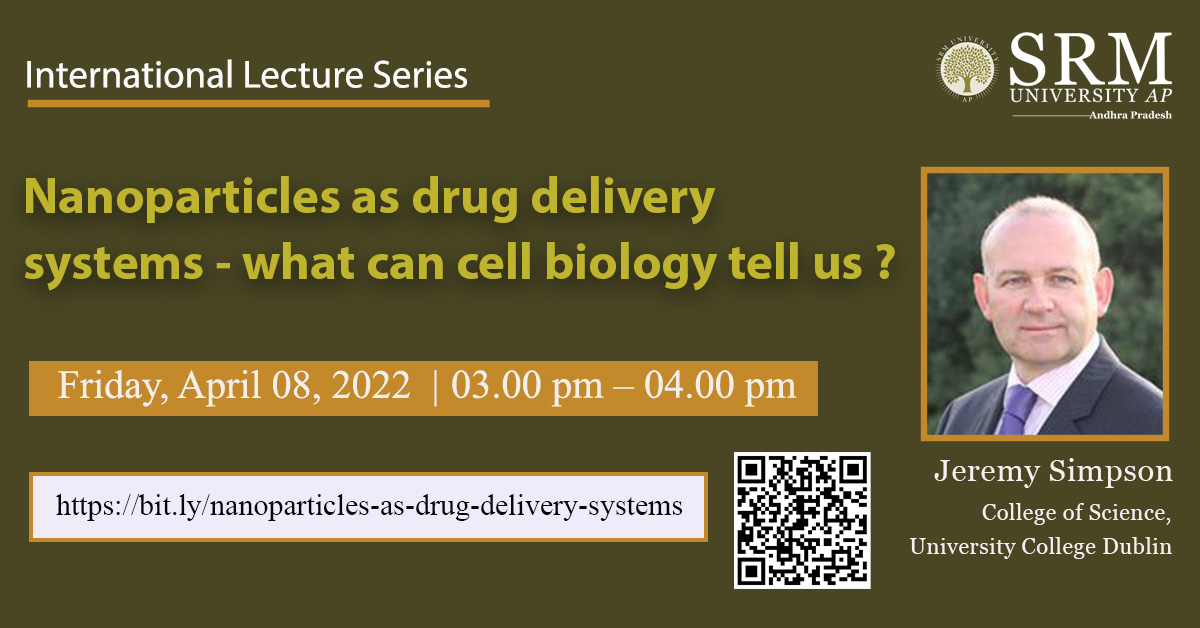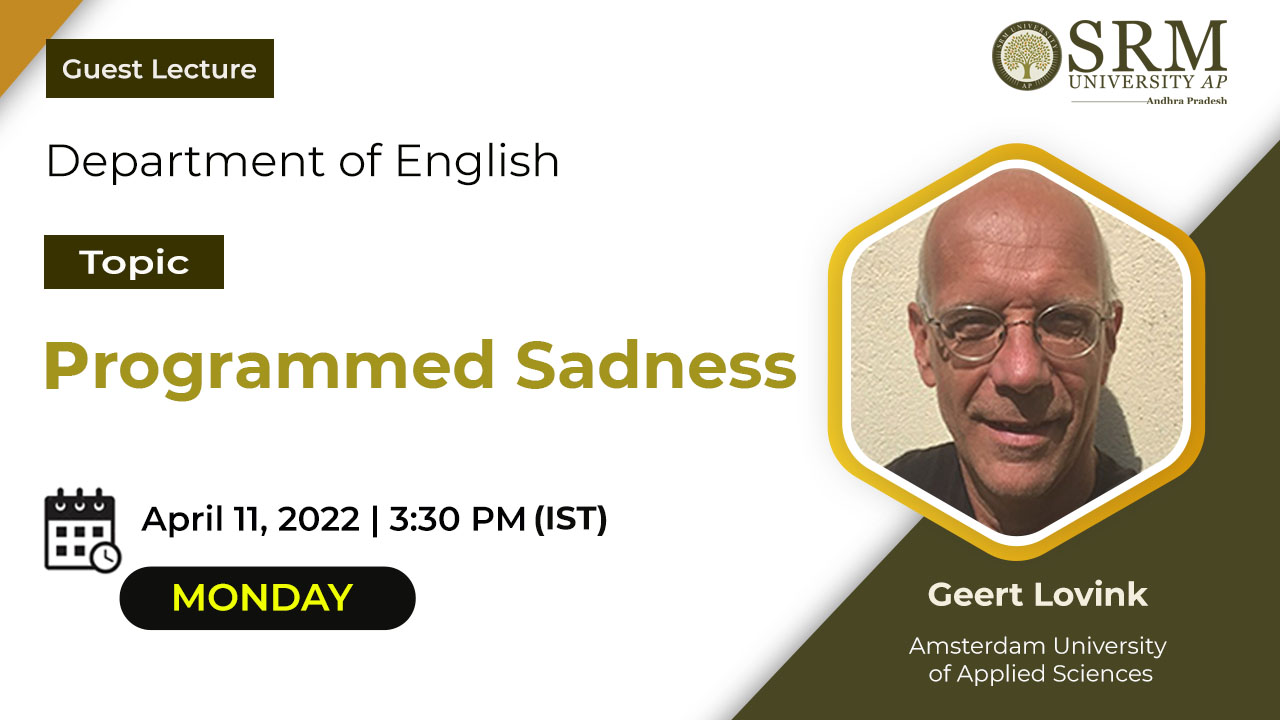- MSc in Advanced Heat Engineering at Cranfield University April 7, 2022
The heat and power industry is undergoing a major transformation, and multinational enterprises must adapt to satisfy ever-increasing present and future demands. The Office of International Relations and Higher Studies at SRM University-AP is organising a lecture titled “MSc in Advanced Heat Engineering at Cranfield University” to educate the students about the importance, scope and opportunities of the field. Dr Kumar Patchigolla, Course Director at Cranfield University will illuminate the participants on the topic on April 13, 2022, at 03.30 pm.
All are invited to participate in the lecture organised as a part of the International Lecture Series.
About the Speaker
Dr Patchigolla joined Cranfield University in 2009 as Lecturer in 2012, Senior Lecturer in 2017 and Reader in 2020. During this period he is involved in the demonstration of low-temperature heat storage (rock bed), thermal driven absorption chiller (Li-Br), combustion (fluidized, pulverized), gasification (fixed, fluidized), the capture of CO2 (Chemical/Calcium looping) and CO2 pipeline and shipping transport facilities, evaluating the effects on component durability and gas cleaning requirements of systems using a wide range of solid fuels. These include biomasses, waste and sewage sludge as well as coal either alone or in different co-fired combinations and supervision of research activities using the Pilot Scale Advanced Capture (PACT) facilities.
Continue reading → - AI/ML algorithms for radio access networks April 7, 2022
The Department of Electronics and Communication Engineering is hosting the first instalment of the Distinguished Industry-Academia Interaction Lecture in the ECE DDIAL series. The event is scheduled on April 9, 2022, at 10.30 am. Dr. Serene Banerjee, Master Researcher, Ericsson Research, will be the keynote speaker. She will deliver a talk on the topic ‘AI/ML Based Interference Diagnostics and Mitigation for Improved Quality of Service in Radio Access Networks’.
Abstract of the Talk
For coverage and capacity optimization, Uplink Power Control is one of the key steps, in addition to antenna tilting and Downlink Power Control. For self-organizing networks, automated algorithms for Uplink Power Control are a necessity. However, Uplink Power Control affects the noise in the neighbouring cells. It is important to detect this interference to monitor uplink noise. Uplink noise due to power control manifests as static interference in the channel. The current state-of-the-art baseline model is based on regression models. We have proposed automated detection of static interference in the uplink channel of cells based on machine learning models. We have evaluated the same on customer data on LTE networks with high accuracy. The detected cells are subsequently used to correct the nominal power parameter through a proposed teacher-student model based on the primary cell and its neighbours. This approach shows better performance than the state-of-the-art baseline methods. The dual of static is dynamic interferences and can be attributed to traffic load, Passive Intermodulation (PIM) and thermal noise, etc. PIM identification is a major component in troubleshooting modern wireless communication systems. The introduction of carrier aggregation has increased PIM occurrences. Current state-of-the-art approaches include manual rule-based and hardware-based debugging. These approaches can detect the occurrence of PIM, long after the event occurrence and result in incurring incidental costs. We propose an ensemble of time series-based machine learning and signal processing approaches that can automatically identify PIM in real-time by analyzing Key Performance Indicators (KPI) of the primary cell and its nearest neighbours. We validate our results for various environmental conditions in data available from LTE and 5G consumer networks. We have further extended the work to multi-frequency time series to handle finer time granularities and detect PIM anomalies in an online learning setting. We further propose a self-supervised reinforcement learning approach to predict PIM related anomalies before it happens. We forecast environmental conditions that give rise to PIM based on offline historical data and model to predict future occurrences. Experimental results are on real-world datasets comprising 50,000+ cells which have shown to accurately predict PIM 60% of the time. To the best of our knowledge, this is the first work, where we are able to predict PIM anomalies before they happen. Post PIM-identification, we propose a binary search-based solution that is amenable to real-time implementation. We show through simulations that this search in tandem with a reinforcement learning-based solution can dynamically mitigate and cancel PIM. Results show that the number of steps to converge, to identify and mitigate the PIM in uplink frequency is reduced by a large factor. To summarize, our contributions include using machine learning algorithms for: (1) robust interference classification, (2) demonstrating p0-nominal recommender as teacher-student model, (3) a times-series analysis-based PIM identification, (4) extending the approach to multi-frequency time series, and for online learning, (5) demonstrating a self-supervised reinforcement learning approach to predict PIM anomalies before they happen, and (6) mitigating PIM, in spite of environmental unknowns, by employing binary search in conjunction with ML/RL-based approaches.
About the Speaker
Serene Banerjee, Master Researcher, Ericsson Research, has 17+ years of industrial experience after completing her PhD from the University of Texas at Austin, under Prof Brian L Evans in 2004. She has completed BTech(H) in Electronics and Electrical Communications Engineering from IIT Kharagpur in 1999. At Ericsson, she is focusing on developing AI/ML algorithms for Radio Access Networks. Prior to Ericsson, she has worked with Texas Instruments, HP, and Johnson Controls. She has 23 peer-reviewed publications, 9 granted patents, and several pending.
Join the webinar for an informative interaction with Dr Serene Banerjee.
Continue reading → - Nanoparticles as drug delivery systems – what can cell biology tell us? April 7, 2022
Guest lectures are a great opportunity for students to learn what the rest of the world thinks/researches. As a part of the International Lecture Series, The Office of International Relations and Higher Studies invites Prof Jeremy Simpson from University College, Dublin to engage the students on the topic “Nanoparticles as drug delivery systems – what can cell biology tell us?”
Nanotechnology advancements have resulted in the creation of related fields such as nanoparticle synthesis and biomedical applications. Patients and doctors alike have been given hope by nanotechnology-driven advancements in treating complicated medical problems.
Join this informative lecture on April 08, 2022, at 3.00 pm and get enlightened!
About the Speaker
Jeremy Simpson carried out his PhD work at the University of Warwick (UK), working on the trafficking of protein toxins in mammalian cells under the supervision of Profs. Mike Lord and Lynne Roberts. After post-doctoral work at the Scripps Research Institute in San Diego (USA) in the lab of Dr Bill Balch and the ICRF in London (UK) in the lab of Dr Rainer Pepperkok, he was awarded a long term EMBO fellowship allowing him to move to the European Molecular Biology Laboratory (EMBL) in Heidelberg (Germany). For over 9 years he worked at EMBL developing and applying novel high-throughput imaging approaches to study protein localisation and membrane traffic. In 2008 he was appointed as Full Professor of Cell Biology at University College Dublin, Ireland. His lab currently applies high-throughput imaging technologies to study various membrane trafficking pathways in the cell, a number of human diseases associated with defects in the endomembrane system, and the molecular basis of how synthetic nanoparticles enter cells and induce toxicity. His lab also has expertise in the growth and analysis of 3D cell models, including spheroids and organoids, and their imaging and analysis using high-content screening microscopy. His lab also develops novel software tools and approaches for image analysis. He has authored 120 peer-reviewed articles, including articles in Nature Cell Biology and Nature Methods, and a number of book chapters. He is a Fellow of the UCD Conway Institute and runs the UCD Cell Screening Laboratory (www.ucd.ie/hcs). Additional academic roles within UCD have included Head of Subject for the Cell and Molecular Biology Programme, Head of the School of Biology and Environmental Science, and Vice-Principal (International) of the UCD College of Science. In September 2021 he took up the role of College Principal and Dean of Science for the UCD College of Science.
Continue reading → - CSE students grab the coveted MITACS Globalink Research Internship April 4, 2022
“When you want something, all the universe conspires in helping you to achieve it”– Paulo Coelho.
Be it a dream or a wish, when you are determined to pursue what the mind really wants, SRM University-AP helps you reach that goal. Ms Pragya Gupta and Ms Swikriti Khadke joined SRM AP with vibrant dreams, and in their third year, they have attained the prestigious Mitacs Globalink Research Internship. The students from the Department of Computer Science and Engineering will spend three months in Canadian universities as a part of this fully-funded research internship. Ms Swikriti will intern at Université du Québec en Outaouais – Gatineau on the research project titled “Systematic PV farm power losses calculation and modelling using computational intelligence techniques”. Ms Pragya will be going to Athabasca University – Edmonton as a research intern to work on the project titled “Blockchains for Data Storage and Mining in Learning Analytics”.
About Mitacs Globalink Research Internship
Mitacs Globalink Research Internship is a highly competitive programme that pairs top-ranked international students having specific research expertise from 15 countries worldwide with faculty at top Canadian academic institutions. This is a twelve (12) week research project of mutual interest between May and October 2022. The Canadian host faculty project leader makes selections by verifying the student’s background and skills in the research area and the unique contribution they will be made to the research during the stay. As a fully-funded programme, Mitacs and AICTE will administer the grant. Students can choose from about 14k+ projects in disciplines like Engineering, Life Sciences, Mathematics, Natural Sciences, Social Sciences, and the Humanities.
Mitacs will be responsible for providing the following to the students:
1. An airfare stipend of Can$1,500;
2. A stipend of Can$175 to contribute to the cost of transportation from the Canadian airport to accommodation unless otherwise arranged by your host institution
3. A stipend of Can$200 per week for living expenses
4. Ensure that students receive Canadian medical insurance.
5. A daily allowance of Can$45 for housing for the duration of the research internship.
6. A stipend of Can$300 for any student fees charged by the Canadian host institution
7. Reimbursement of immigration permit application fees (as required to participate in the research internship — up to a maximum of Can$240)
8. A stipend of Can$500 for any COVID-19-related expenses (e.g., COVID test, quarantine, expenses incurred during isolation, etc.)The journey, in Pragya and Swikriti’s words:
The journey from applying for MITACS to getting selected as one of the GRI interns in one of the top-ranked universities in Canada was no less than a dream come true. The registration process included filling out an application form which was the most important step and a complicated one. This was also an elimination stage for many because writing down all our details in a limited number of words was quite difficult and challenging. After submitting the application form, the details about the Matching round were intimated in November. We received emails for the interview round from the professor himself. It was a technical interview that comprised of questions regarding our work experience, knowledge about the technology we will be contributing to the project during the internship, and personal details. The interview lasted for 30-45 mins, after which the professor assigned us some tasks to assess our knowledge regarding the topic. After completing and submitting the task, around Mid December, we received a congratulatory mail regarding our selection for MITACS GRI 2022, which will commence from May 2022 and continue for the next three months.
The Globalink Graduate Fellowship offers former Globalink research interns:
■ Direct financial support from Mitacs
■ Recognition as Globalink alumni
■ The opportunity to work with Canada’s research supervisors during your graduate studies
■ Additional exposure to the Canadian research and innovation landscape and increased Canadian experience.A note of gratitude
“We would like to thank SRM University-AP, Andhra Pradesh, for helping us build our skills and supporting us throughout the process. Our university management has always been kind and helpful to its students to explore new opportunities and create new relations. We would like to extend our gratitude to our mentors, Dr Goutam Kumar Dalapati and Dr Anil K Suresh, for their continuous support, guidance, and motivation. Last but not least, our parents have been our support system throughout our journey”.
Continue reading → - Programmed sadness in the desire for connections and recognition April 1, 2022
“Social media reality may be seen as a magical realm where we belong. That’s where the tribes gather, and that’s the place to be – on top of the world. Social relations in “real life” have lost their importance”– David Brooks
Technological sadness has become the default mental state of the online billions. The Department of English at SRM University-AP organises a guest lecture titled “Programmed Sadness” on April 11, 2022, to discuss the emotional analytics of network cultures. Prof Geert Lovink, Amsterdam University of Applied Sciences, will engage the participants at 3.30 pm on that day.
What happens when nothing can motivate you anymore, when all the self-optimisation techniques fail, and you begin to carefully avoid these forms of emotional analytics? Compared to others, your ranking is low – and this makes you sad. In this presentation, Dutch media theorist, internet critic and founder of the Institute of Network Cultures will discuss the dark side of the net. The mental state of internet users is tragic. Instead of empowerment and self-organisation, what we mostly see around is anger and despair. How did we end up like this? The lecture will zoom in on the widespread techno-sadness that is produced by dominant social media platforms through ‘behavioural modification’ (also known as ‘nudging’) with the aim to keep users coming back to the app, exposing them to even more personalised ads. Instead of empowerment and diversity, we witness a ‘chilling effect’ of hyper conformism, resulting in anger, sadness, depression and loneliness. This is the social reality today.
About the speaker
Geert Lovink is a Dutch media theorist, internet critic and author of Uncanny Networks (2002), Dark Fiber (2002), My First Recession (2003), Zero Comments (2007), Networks Without a Cause (2012), Social Media Abyss (2016), Organization after Social Media (with Ned Rossiter, 2018), Sad by Design (2019) and Stuck on the Platform (2022). He studied political science at the University of Amsterdam (UvA) and received his PhD from the University of Melbourne. In 2004, he founded the Institute of Network Cultures (www.networkcultures.org) at the Amsterdam University of Applied Sciences (HvA). His centre organises conferences, publications and research networks such as Video Vortex (online video), The Future of Art Criticism, and MoneyLab (internet-based revenue models in the arts). Recent projects deal with digital publishing experiments, critical meme research, participatory hybrid events and precarity in the arts. From 2007-to 2018, he was a Media Theory professor at the European Graduate School. In December 2021, he was appointed Professor of Art and Network Cultures at the UvA Art History Department.
All students and faculty members are invited to join this illuminating session on April 11, 2022, at 03.30 pm via the zoom platform.
Continue reading →





